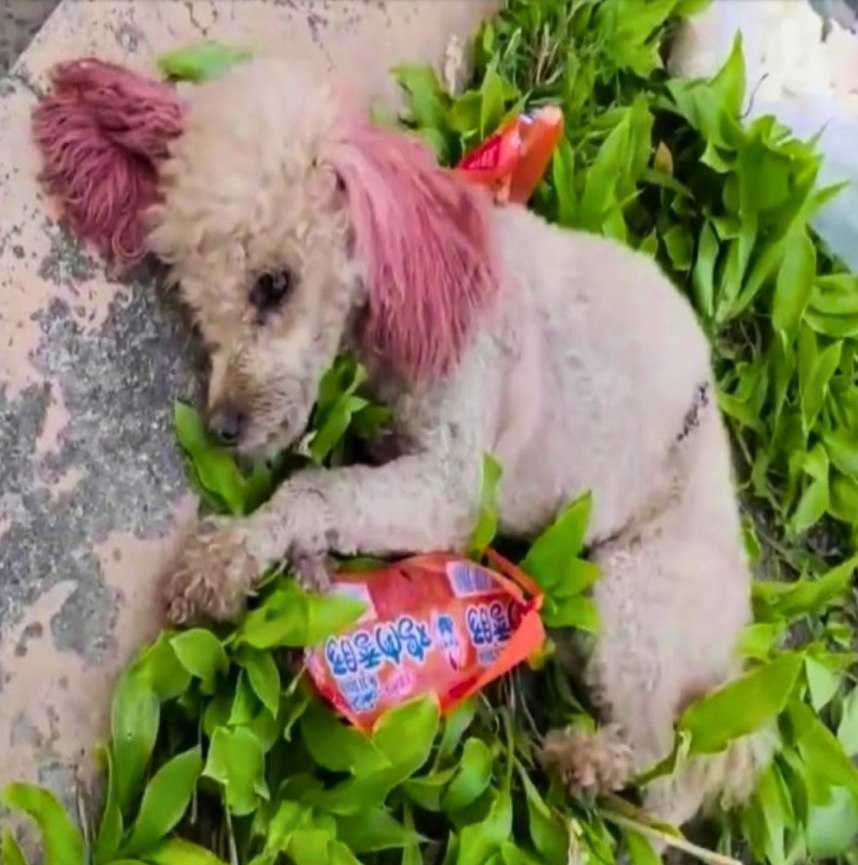Late one quiet evening, an urgent message rang out over the loudspeakers at a small animal rescue camp managed by a dedicated volunteer named Li Liu. The announcement called for the owner of a lost dog to come quickly to the south entrance to reclaim their pet. The air was thick with tension and worry as staff and volunteers paused in their routines, wondering who the dog might belong to. In the midst of this, Dr. Song, the camp’s lead veterinarian, stood calmly by the side of an elderly dog that had just been rescued and was now finally resting.

“The older dog is finally at peace,” Dr. Song observed gently, watching the dog slip into sleep. He crouched down to inspect the animal more closely, noting a severely injured ear, the edges raw and torn. As he looked further, he gently touched one of the dog’s legs and remarked, “This leg was trembling earlier. He seems to be doing a bit better now that he’s asleep.” There was a softness in his tone—a mixture of concern and hope that perhaps the worst had passed for this animal.
The night at the rescue center didn’t slow down. At exactly 9:41 PM, another urgent call for help came through—this time from Harbin. The details were grim: a dog had been hit by a car in the Hulan district. It was located on Nanjing Road, and someone had called it in. Dr. Song, unwavering in his commitment, made his way to the scene immediately. “I’m at the community shown here on screen,” he reported, standing in the chilly air as he awaited the arrival of the person who had witnessed the incident.
A few moments later, someone approached—a local resident who had seen what had happened. Dr. Song turned to them and asked gently, “Is this the dog?” The person nodded solemnly. “They abandoned it at the main entrance,” they said, their voice tinged with quiet frustration.
The witness recounted what they had seen earlier in the day, their expression becoming increasingly concerned. “This afternoon, I noticed it lying there on the ground. Its legs were moving constantly—almost like it was in pain or trying to escape something,” they said. Dr. Song, still kneeling beside the dog, looked up and asked, “Did it eat anything at all today?”
The answer was heartbreaking. “No,” the witness said, shaking their head. “It hasn’t eaten anything—not a single bite of food, and not even a drop of water.” The weight of those words settled over them both. The dog, clearly malnourished and in shock, had been left to suffer alone in the open.
Dr. Song didn’t hesitate. Drawing on years of experience and instinct, he swiftly began organizing a treatment plan in his mind. “We’ll begin by relieving the pain. That’s most important. Then we’ll administer medication to stop the internal bleeding. After that, we’ll give it nutritional supplements to support its strength,” he explained with a calm, steady tone, masking the urgency in his heart. He moved with quiet focus, tending to the wounds with care—cleaning each injury, applying medication with gentle precision, and whispering soothing words as he worked.
What gave him hope was how calm the dog remained. Despite the obvious pain, the animal didn’t resist or lash out. Instead, it lay still, its eyes occasionally meeting Dr. Song’s, as if it understood that someone was finally trying to help. That unspoken trust touched something deep in the veterinarian. He knew this dog—this fragile, battered soul—was still fighting to live. And he would fight with it.

After completing the initial treatment, Dr. Song looked around and addressed the small group that had gathered nearby. “Thank you, everyone,” he said sincerely. “Please help spread the word. Someone out there might be looking for this dog. Maybe we can reunite them.”
He continued, sharing the next steps in the recovery process. “We’re planning surgery on the ribs. It’s delicate work, but necessary. The dog has internal damage that we must address if it’s going to heal fully.” Even after so many years in rescue work, Dr. Song never lost sight of the hope that came with each saved life.
Days passed, and the dog’s condition gradually improved. Through the careful treatment and daily attention at the animal hospital, the once hopeless case began to recover. The staff affectionately began calling him Teddy—a fitting name for a dog with such quiet strength and a soft gaze that melted the hearts of those around him.
Eventually, Dr. Song had good news to share. Teddy had recovered well enough to be discharged from the animal hospital and was now living at the rescue camp under the watchful eyes of the staff. “He’s doing great,” Dr. Song reported, smiling for the first time in days. “He’s eating, he’s walking, and most importantly—he’s safe.”
The journey wasn’t easy. It rarely was in the world of animal rescue. There were too many nights like the one when Teddy first arrived—filled with pain, uncertainty, and heartbreak. But in moments like this, when an animal got a second chance, it reminded everyone why they did this work. Why they stayed up through the night, answered every call, and gave everything they had to creatures who couldn’t speak but always hoped someone would listen.
Teddy’s story, though filled with suffering, ended in a place of comfort. The rescue team, led by Dr. Song, had not only saved a life but had given it back its dignity, its peace, and its future. In the end, the long hours, emotional strain, and physical exhaustion were all worth it. Because every now and then, there was a success like this—proof that compassion, commitment, and a little bit of hope could make all the difference.





